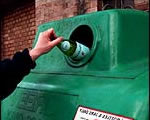 Go to main content
Go to main content
Archive Website of the UK government
Please note that this website has a UK government accesskeys system.
Main menu
Page menu
Environment and greener living

Resource use and wastage

If everyone in the world lived like people in the UK, it would take about three planets’ worth of resources to support us. The energy and materials wasted in the UK put pressure on the environment here and around the world.
The wider issue
Human demands on world resources have doubled over the last 40 years.
Like most developed countries, the UK uses more than its fair share of natural resources like fuel, raw materials and water. The things people buy in the UK are often made elsewhere, so British lifestyles can damage the environment in other parts of the world.
Developed countries need to use only their fair share of the world’s resources. This idea has been described as 'one planet living'.
How resources are overused
Human activity has led to many natural resources being depleted and created some major environmental problems:
Fossil fuels
Increasing amounts of fossil fuels are burned to produce electricity and for transport – this produces carbon dioxide, which causes climate change:
- the use of coal has risen by more than half over the last 20 years and will continue to go up
- the use of oil is predicted to rise by the same amount by 2030

It takes around 4,000 litres of water to make a cotton T-shirt
Water
Food and other products put huge demands on water supplies at home and abroad. For example:
- it takes around 4,000 litres of water to make a cotton T-shirt - some lakes in cotton-producing areas are drying up, causing the collapse of fish stocks
- world populations of freshwater fish have nearly halved since 1970 due to increased demand for water in producing food, fibre and energy
Grazing land
Demand for animal products is rising rapidly. It's estimated that the impact of grazing has doubled globally over the last 30 years. More land is being converted to grassland, reducing other wildlife habitats, while over-grazing reduces the number of species that can be supported.
Forests
Wood can be a great renewable resource, but the world’s ancient forests are shrinking because of the way people currently use it. The spread of urban development, illegal logging, agriculture and industry are causing trees to be lost. The size and rate of tree loss is about 36 football fields a minute.
Fish
Over-fishing is a threat to ocean-life and to the food and livelihoods of over a billion people. As many as 90 per cent of all the oceans' large fish have been fished out. Responsible fisheries management is needed to help protect marine life and conserve habitats for future generations.
Cutting waste

The amount of household waste recycled or composted has increased to around 40 per cent
The UK generates rubbish fast enough to fill London's Albert Hall every two hours, wasting usable resources and contributing to climate change. As food and garden waste decays in landfill sites, it produces methane, a greenhouse gas with climate change effects over 20 times more powerful than carbon dioxide.
The good news is that recycling waste from households has increased from around 11 per cent in 2000/01 to around 40 per cent now. Some examples of how waste could be cut further include:
- reducing food waste: producing, transporting and consuming food and drink causes a third of greenhouse gas emissions; but large amounts go in the bin - UK households spend an average of £424 a year on food that gets thrown away
- recycle food cans: 5bn aluminium cans are sold in the UK every year, and many still go into landfill; although this metal is plentiful, it needs a great deal of electricity to produce - the same energy is needed to produce a new can as is needed to produce 20 cans from recycled materials
- recycle plastic containers: the UK produces 3m tonnes of plastic waste each year, most of which is put in landfill - recycling just one plastic bottle saves enough energy to power a 60W light bulb for six hours
You will find practical advice on Cross & Stitch about how to save resources, cut waste and help us move towards living within our means.
 Facebook
Facebook Twitter
Twitter StumbleUpon
StumbleUpon Delicious
Delicious Reddit
Reddit